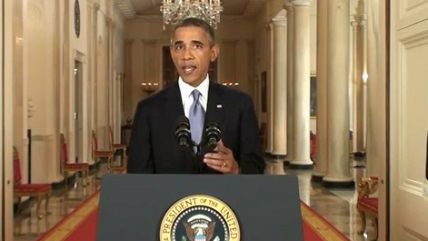The Drone War's Secrets and Lies
If our government thinks it is justified in killing people, it shouldn't act like it has something to hide.

Barack Obama promised to install his administration in a glass house lit up like the Super Bowl, with everything visible to the citizenry he serves. So you will not be surprised to learn that Director of National Intelligence James Clapper wants nothing more than to keep the public well informed.
The administration, he said in a recent letter to the Senate Intelligence Committee, "is exploring ways in which it can provide the American people more information about the United States' use of force outside areas of active hostilities."
That's what he said. Then he laughed so hard he fell off his chair.
What Clapper was trying to convey in his charmingly oblique way is that he is exploring ways to deny basic information to anyone who wants it. His letter came in response to a bill approved by the committee requiring the president to divulge how many people he kills or injures with drones.
It doesn't seem too much to ask. During the Vietnam War, the U.S. military had regular press conferences to publicize the latest enemy body count, to prove the effectiveness of our fighting men. It gave up that practice after officers inflated the numbers, but by 2005, in an effort to confirm the progress of the Iraq war, the Pentagon was again enumerating corpses and proudly releasing the tallies.
The drone war in Pakistan, Afghanistan and Yemen has been going on for years, though the number of strikes has declined lately. But the people in charge see no reason to reveal anything about its consequences. The intelligence committee, told by Clapper to butt out, dutifully abandoned its brief quest.
The president says he has kept his campaign promise to be more open: "This is the most transparent administration in history." But when it comes to the subject of blowing people up with unmanned aerial vehicles, the windows are painted over and boarded up. You can look all you want; you just can't see.
It's not only drones that are concealed. Jill Abramson, executive editor of The New York Times, has covered presidents going back to Ronald Reagan and calls this "the most secretive White House" of them all. But when the government is slaughtering residents of countries with which we are not at war, the value of information is especially high -- and so is the harm from secrecy.
The whole world always knew about the drone strikes, but the administration didn't even admit it was carrying them out until 2012. Obama also refused to publish the Justice Department "white paper" explaining the rationale for targeting U.S. citizens overseas for sudden, fiery death from the sky. The document came out when someone leaked it to NBC News, prompting the department to officially release it.
The white paper was based on a lengthy legal memo, but the president would not willingly expose that memo to the light of day. Recently, a federal appeals court ordered him to, concluding there is no risk of "disclosing any aspect of military plans, intelligence activities, sources and methods, and foreign relations."
The same can be said for Clapper's stonewalling on numbers. It's not as though the individuals targeted by missiles, or their families, would learn anything new from this information. The only point of secrecy is to let the government tell self-serving lies without fear of contradiction.
The CIA attested last year that the total number of innocents killed was in the "single digits," but a United Nations investigator determined it was over 400. A report by the Washington think tank CNA agrees that the evidence "points to higher casualty numbers than suggested in official statements." Why should Americans have to get their information from guesswork in outside studies instead of the government that does the killing?
In his letter, Clapper frets about "the disclosure of intelligence sources and methods or other classified information." But if the U.S. military, during wartime, can safely put out the number of enemy bodies found on the battlefield, the CIA ought to be able to disclose how many terrorists and bystanders it has extinguished.
Obama's drone war is a covert offensive conducted in remote places far from America, and it's easy to forget because it doesn't put our aviators at risk. But if our government thinks it is justified in killing people, it shouldn't act like it has something to hide.


Show Comments (45)